Introduction: In this article – to celebrate today being National Pickle Day – Gena Philibert-Ortega searches old newspapers to find our ancestors’ pickle recipes. Gena is a genealogist and author of the book “From the Family Kitchen.”
National Pickle Day is today! What pickle will you eat to celebrate? Will it be the sour dill pickle or maybe the neon green Chicago Hot Dog relish? Maybe you are partial to bread and butter pickles? How about a pickled vegetable that harkens to your ancestral roots like sauerkraut, kimchee, or Mexican pickled carrots?

Pickles have been around for thousands of years and were the part of your ancestor’s diet that added extra flavor and a boost of Vitamin K.*
Whatever type of pickle it is, pickles have an important place in history and rightly so. Pickling helps take fresh produce and preserves it so that it doesn’t spoil. The process of pickling immerses raw produce in acidic liquid or saltwater brine until it is no longer susceptible to spoilage.**
Historical newspapers are filled with standard cucumber pickle recipes, including this 1902 version that calls for horseradish, vinegar, salt, mace, onion, black pepper, turmeric, mustard, green pepper, and onions.
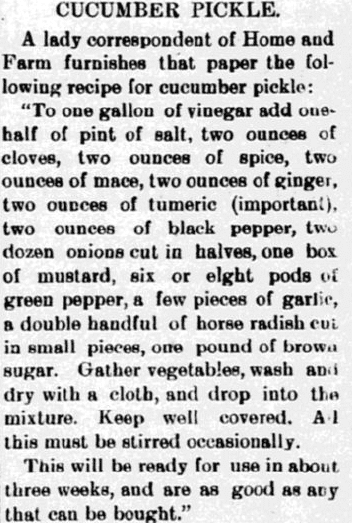
Beyond the Cucumber
Everyone is familiar with pickled cucumbers, but pretty much anything can be pickled. While you may stick to the tried and true cucumber, your ancestors pickled fruits, vegetables, and even meat.
One example of a pickled fruit is this 1961 “delightful” golden watermelon pickle recipe which calls for 1-inch cubes of rind with the green and pink portions removed, cinnamon, and cloves. Watermelon pickles make good use of the watermelon rind that might otherwise be thrown away.
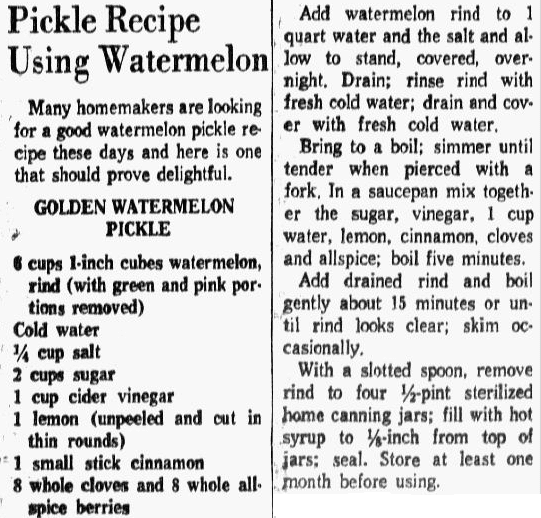
Tomatoes are another fruit that can be pickled. Green pickled tomatoes taste great and this old “New England recipe” using a crock might be of interest to those who want to try their hands at making this type of pickle. This recipe calls for brown sugar, chopped peppers, ginger, allspice, salt, cloves and cinnamon.
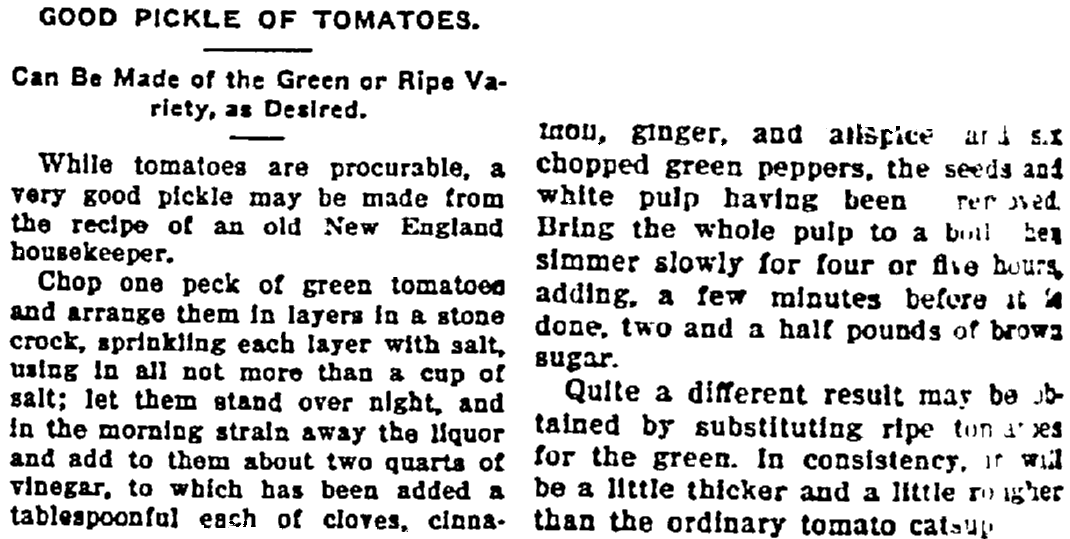
Pickled Meat
My guess is that you may have just read the header “Pickled Meat” and groaned a bit. Some of the men in my family enjoy pickled pig’s feet, which do not appeal to me at all, but I too have enjoyed other types of “pickled” meat. After all, corned beef is “pickled,” and modern-day cooks might use a brine (which uses water and salt) to prepare their Thanksgiving turkey.
This 1883 newspaper article about pickling meat points out the waste that ensues when meat is not cured. Pickling, of course, helped preserve foods for the long term and was vital in the years before refrigeration. This article states that this pickled meat recipe is a popular one published over the years, and is superior to all other recipes. This recipe includes the use of saltpeter to remove surface blood “leaving the meat fresh and clean.”
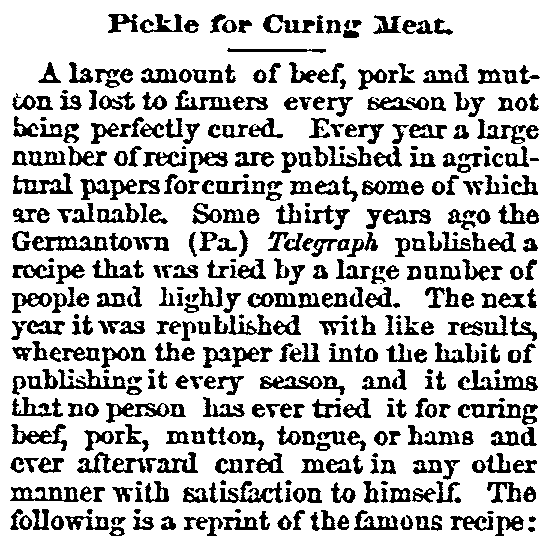
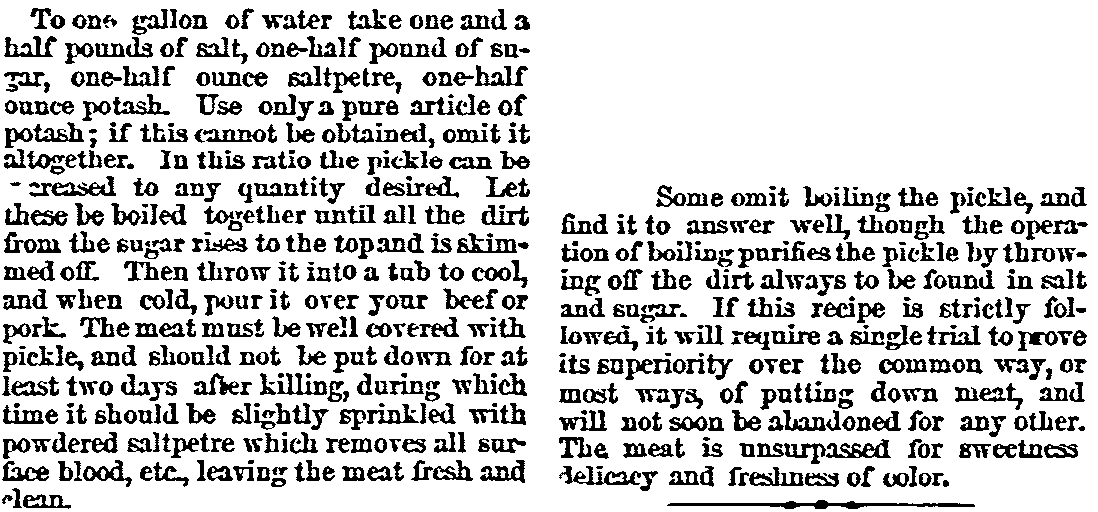
I love this corned beef recipe that includes the instruction to immerse the beef into a pot of water and saltpeter, and then count to ten slowly before removing it. The beef is eventually packed in a barrel with a liquid consisting of saltpeter, molasses, salt, sugar and pearlash (potassium carbonate).
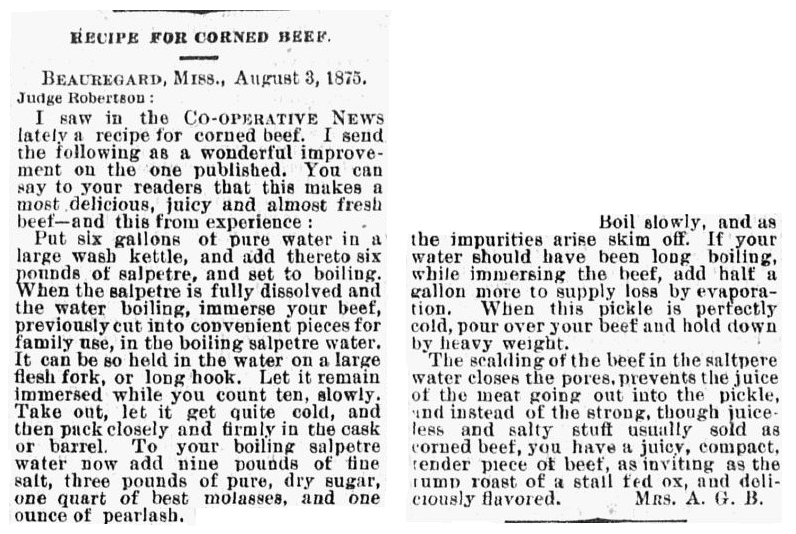
What Are Your Favorite Pickles?
I love all types of pickles and pickled foods – what about you? Do you have any special memories of familial pickle recipes? One pickle relish I remember my grandmother made is “Chow-Chow.” This North American relish can differ in the vegetable ingredients used depending on the region. Chow-Chow is served as a condiment (I vaguely remember that we ate it with beans). Depending on the region and ingredients, Chow-Chow varies in sweetness.***
Do you make pickles? I’d love to hear about your food memories in the comments section below.
———————–
* “Why You Should Care About National Pickle Day,” Titos (http://texastitos.com/care-national-pickle-day.html: accessed 4 November 2017).
** “History in a Jar: The Story of Pickles,” The History Kitchen (http://www.pbs.org/food/the-history-kitchen/history-pickles/: accessed 4 November 2017).
*** “Chow-chow (food),” Wikipedia (https://en.wikipedia.org/wiki/Chow-chow_(food): accessed 4 November 2017).
Related Articles:

When I was growing up my mother made sweet pickles every year in June. She would buy the small gerkin or pickling cucumbers and my sister and I would take a small scrub brush and scrub the little black specks off the outside. This would have to be done before mother could begin the 2 week process of curing the pickles in big, heavy ceramic “crocks”. The pickles were soaked in salt water for one week and weighted down carefully with plates and clean rocks to keep them submerged. The second week they were handled daily changing the syrup and adding sugar until they were perfect. I didn’t have a store bought pickle until I was in high school and the cucumbers were not available – my family all thought the store bought ones were just AWFUL!
Those homemade sweet pickles are my favorites to this day – I make them each year just like my mother did!
Kathy,
I can imagine those homemade pickles are much better than store bought. I’d love to taste those!
Thanks so much for writing in and sharing your memory with us.
Gena
Thank you for sharing these old school recipes! Great to see the clippings and imagine how it would have been made back then. Thank you for sharing!
Billy,
I love these old recipes! As you mentioned, it’s a great way to take a look at our ancestor’s lives.
Thank you so much for reading the article.
Gena